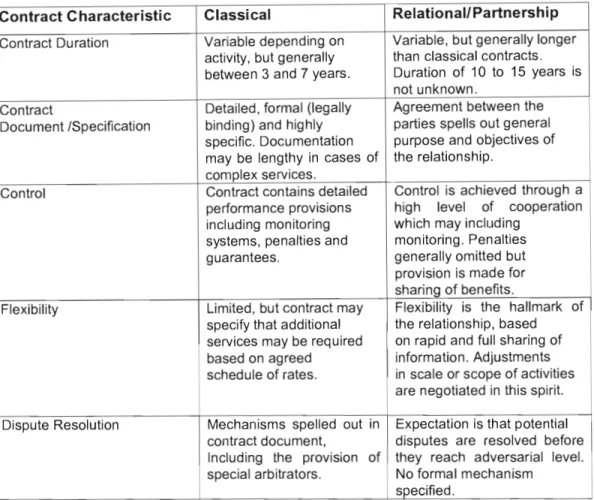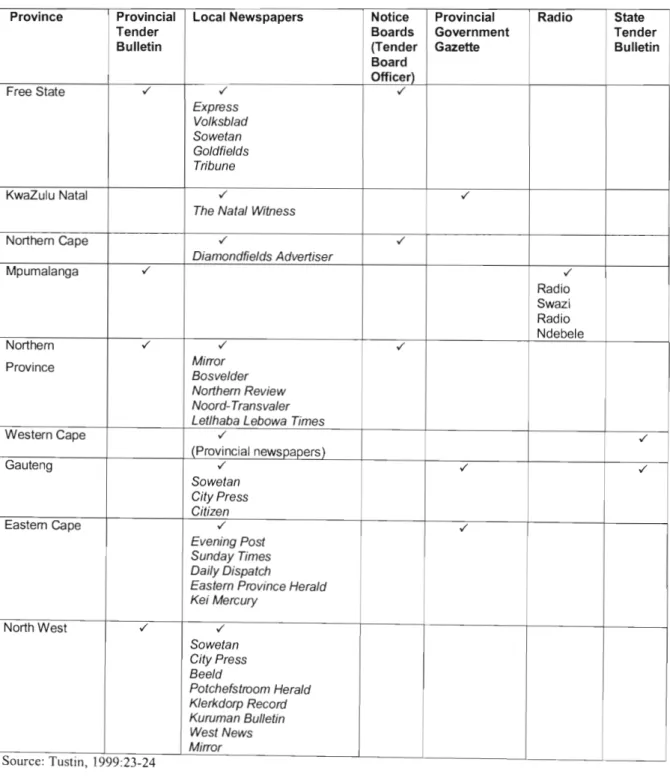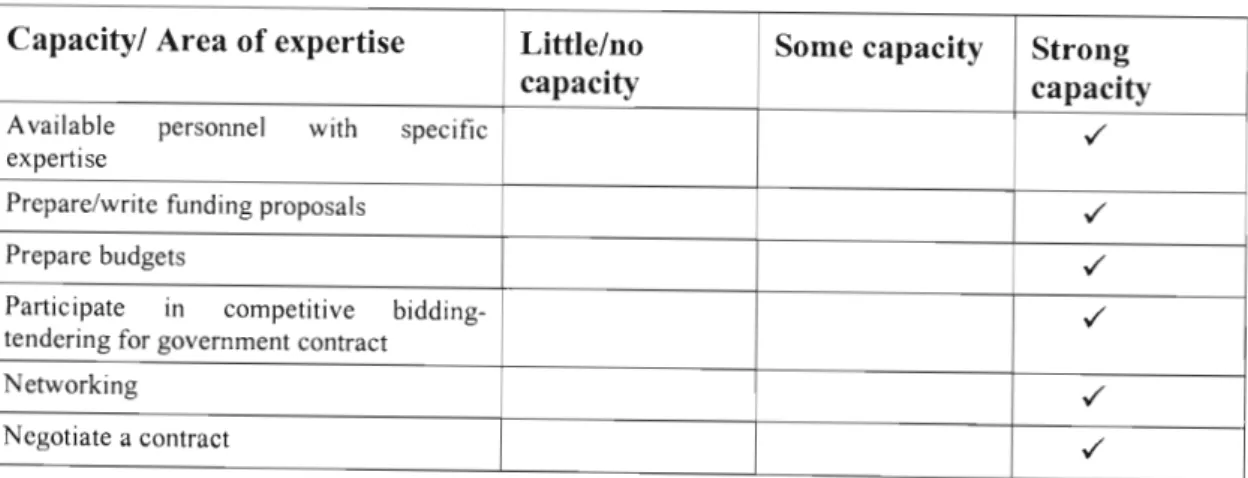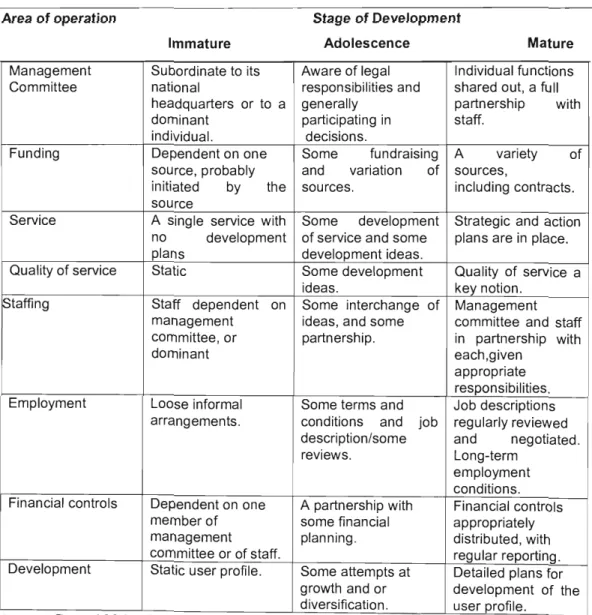The case study of the Association for Rural Development (AFRA) indicates that the practice of contracting NGOs in South Africa is still relatively new and therefore imperfect due to severe capacity constraints. One of the challenges facing the government and NGOs in South Africa today is to place themselves within the 'new contractual relationship'.
Definition of key terms
Connor and Bamett (2001:4) define a contract as a legally binding agreement between a buyer (eg the government) and a contractor (eg the NGO) to acquire services or property for the direct benefit or use from the buyer, in return for payment to the contractor. The term competitive tendering refers to the process of requesting and receiving submissions (tenders) from prospective service providers, and selecting one or more of these based on a formal evaluation (Domberger, 1998: 12).
Research Methodology
What is the nature of the contracting or funding relationships between the government, communities and contracted NGOs. I am indebted to AFRA and other organizations who kindly allowed me to use their annual reports, project documents and newsletters for the purpose of the research.
Structure of the Dissertation
Before undertaking an analysis of 'new contractual relationships', a clear conceptual understanding and definition of the terms 'contract' and 'contract approach' should be explored. The problem of the balance of power is reflected in the contractual relationships between the government and the nonprofit sector.
Contracting in Theory and Practice
Tandon (1989), Bratton (1989) and Jones (1993) have developed models to understand the nature of the relationship between the state and civil society organizations. The first prerequisite is the degree of goal coherence between the state and the NGO.
Towards an Understanding of Classical and Relational Contracts
As Muir (1992:12) points out, the comparative advantage of NGOs lies in the quality of the relationships they create. One of the most important contributions that the NGO sector can make is the provision of basic services. Bornstein offers two perspectives on the effects of contract implementation on government and non-governmental organizations.
However, the state's slow bureaucratic apparatus frustrated all hopes for rapid delivery of services. As Jones (2001:2) notes, failure to form part of the contractual arrangement early in partnership formation can hinder NGO power. For example, the Mvula Trust was not an initial partner or part of the contractual arrangement in the DurbanlPietermaritzburg project.
This initially disadvantaged Mvula Trust in the power balance of the relationship (Jones, 2001 :3).

Chapter Three: Emerging Global Trend Towards Contracting
Questions for South Africa
NGOs in South Africa are under increasing pressure to learn from other countries' contracting experiences and to articulate their developmental roles in the new political order. While contracting will no doubt continue, the question facing South Africa is whether the NGO sector is capable of managing contract work for the government while at the same time advocating for community needs. Developing a successful contracting culture is a long-term task, so it is important for South African NGOs to have realistic expectations about their ability to manage a contract and how flexible they can be in service delivery.
For South African NGOs, tendering for government contracts may weaken their ability to engage in the interactive development processes that are often necessary in capacity building at the local level. In light of the questions raised above, it is clear that the political and legal frameworks within which contracting takes place are key factors to consider in achieving a successful contracting relationship between governments and NGOs. As shown in this section, it is clear that without a concerted effort by the national government to reform the tendering system, little will change in terms of service delivery.
Chapter Four: The NGO Contracting Environment in South Africa - A Case Study of the Association for the Advancement of Rural Affairs (AFRA).
Chapter Four: The Environment for Contracting NGOs in South Africa- Case Study of the Association for Rural Advancement (AFRA)
Overview of the Contracting Environment in South Africa
In South Africa, government and NGO capacity in these areas is currently limited. According to Hassen, outsourcing and outsourcing form a paradigm, which he calls the contracting model, which indicates a definite shift in strategies to transform the public service in South Africa. Among the obstacles to NGOs' ability to accept or perform satisfactorily in government contacts in South Africa are funding uncertainty, lack of experience in contracting and the difficulty of working with rather than opposing government (Motala and Hussey, 2001).
Recognizing that collaboration between NGOs and government is important in achieving development priorities, the government encouraged NGOs to tender for contracts as a measure to explore partnership in service delivery. Table 4 above shows that the South African government uses various means of communication to promote tender opportunities, such as advertisements in the government gazette or tender bulletins, notice boards in offices, local newspapers and radio stations. The South African Government's current procurement policy is set out in the Green Paper on Public Sector Procurement Reform (Government Gazette: 1997), which aims to improve access to tender information.
According to Fagan (1997:1), only 40% of SMMEs in South Africa are ready to compete for tenders, while the balance needs additional skills and capacity.

AFRA and the Future Challenge for NGO Contracting
- Funding
- Community Projects
Changes in the socio-political environment during the period 1990 to 1994 have had major consequences for the operational focus and development of the organization. Examples of the types of projects the organization could tender for include monitoring evictions and implementing security enhancements. AFRA also assisted communities in establishing the Tenure Security Coordinating Committee and the Farm Eviction and Development Committee (AFRA, 2000: 15).
This is one of the successful projects undertaken by the organization in the land rights struggle, which culminated in the ceremony attended by President Thabo Mbeki to formally transfer the title deed to the AmaHlubi community (AFRA, 2000:17). AFRA has been involved in contract work with the DLA provincial office since 1995. It is clear from the work of the two projects that forging partnerships between AFRA and government comes with serious capacity constraints.
However, it is unfortunate that the organization does not have the necessary resources to support land redistribution outside the government process.

Mvula Trust and Contracting Experience in Water Delivery Partnership
- The Rural Water Supply Programme (RWSP)
Issues and challenges arising from the RWSP contracts are noted at the end of the chapter. When communities are actively involved in the project cycle, as in the case above, there is a good chance that they will feel more involved in the outcome of the project. The third and final set of contracts, as drafted by the RWSP, involves community groups and private contractors.
The role of the private contractor is to provide technical, managerial and administrative advice to the water committee. Some advantages and disadvantages emerged in RWSP and those seen as important are isolated. One of the disadvantages of RWSP is the possibility that users do not pay for services.
While a community-run project such as the RWSP undertakes to improve service delivery, it must guard against losing its legitimacy.
Issues in Contracting
- Complicated Tendering Procedures
- Tense Contractual Relationships
- Bureaucratic Delays
- Lack of NGO Capacity in Planning and Implementing Projects
- Lack of Community Participation
A government representative in the provincial office of the Procurement Council pointed out that the procurement process can be viewed from the perspective of the buyer (government) and the supplier (NGO or SME). For example, in the case of the buyer, the government uses State Tender Boards to identify and communicate procurement opportunities to potential bidders (Interview with government representative, July 17, 2001). A tender is a detailed and itemized assessment of the costs of each element of a service.
Outsourcing to NGOs is more than filling service gaps; rather, it requires the commitment of government and NGOs to improve the lives of the communities they work with. Through its Rural Social Movement initiative, AFRA has been influential in strengthening the voice of the community. It allows three partners to participate in the elaboration of the action by sharing their experiences, questions, ideas and suggestions.
It is clear that if communities are actively involved in the project cycle, they will be more committed to the outcome of the project.
Recommendations
The role of the state in South Africa must be limited to the performance of core functions or other areas that are not addressed by private (profit or non-profit) organizations. The implications of the government's shifts in economic policy for reducing poverty in South Africa", in Barberton, C, Blake, M and Kotze, H. Creating Action Space: The Challenge of Poverty and Democracy in South Africa, Idasa and David Phillip Publishers, Cape Town. Charity Aid Foundation. (2000). Working with the non-profit sector in South Africa, CAF Southern Africa, Braamfontein.
Two commas and a period: Civicus Index on Civil Society- South Africa Country Profile, Idasa, Cape Town. Administrative Constraints on Policy Making in the New South Africa: Government Failure and the Ncholo Report, Working Paper in Economics, University of New England. The State of Civil Society in South Africa: Past Legacies, Current Realities and Future Prospects, Johannesburg.
South Africa The Limits of Change: The Political Economy of Transition, Zed BookslUniversity of Cape Town Press, Cape Town.
Cover Letter
Research Questionnaires Background Information
Given the advocacy background of the NGO sector, how will the partnership with government affect the independent voice of NGOs. Please describe any management changes in your organization's relationship with the international donors in the last five years (this includes new donor reporting requirements, changes in donor priorities)?. Is it possible for your organization to have a partnership and contract relationship with the government at the same time?
Does contracting offer your organization the opportunity to become a partner with donors and governments, what is the nature of the partnership in the short and long term? What is the level of central government funding to your organization over the past five years? If your organization is engaged in contract work, does that really require a different management style, given the issues of accountability, reporting requirements and transparency?
Does contractual relations shift the focus of your organization to be oriented towards profit or commercialization?
Names of People Interviewed
In terms of contracting, does it create compromises between NGO-Government relations and to what extent does it affect the beneficiaries? Has there been proper consultation with communities and other stakeholders regarding contracting. What does outsourcing signal to your organization, is it a threat or an opportunity in terms of relations with government and donor agencies.
